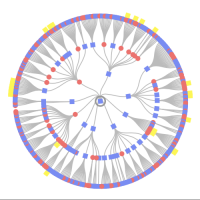Robo-standardization error: York -> Guatemala

Please escalate.
Search result:
Historical record:
Best Answer
-
@dontiknowyou Perhaps I can use this example to try to explain what we can and cannot send to engineers.
We need to be able to determine how the place should have been standardized before we can send it on. Search results always show a standardized place. Sometimes we can determine the proper place by looking at the record image. Some collections do not give us that option and some images don't show the place info. The border crossings do not have images available to us, so we have to see what we can conclude using only the record details information.
In the example you cited, on the record details page (https://www.familysearch.org/ark:/61903/1:1:X22K-Z48), it says John was born in Bardo and gives his race as Scandinavian. This gives us a clue as to what Bardo we might be talking about. I find a Bardo, Troms, Norway, so I can be relatively confident that this is how the place should have been standardized. So, I can and will report this mismatch between search results and the records details page. You suggested Bardo, Alberta. I'm not finding such a place in our standardized places and the "race" designation of Scandinavian implies that John immigrated to Canada from Scandinavia.
0
Answers
-
@dontiknowyou We can report the inacurrate birthplace standardization for you, but we first need to know what the correct birthplace is and some evidence/source that confirms the correct birthplace. Can you provide that information for us?
0 -
Please see above. Birthplace is indexed York... and Search result reflects application of the standard York, Morales, Izabal, Guatemala.
The record is attached to LLW9-RN3
0 -
@dontiknowyou OK. I'll not be able to report that one since we have no way to know what York... is meant to represent.
0 -
we have no way to know what York... is meant to represent.
Exactly! And that is why it should be reported. It should be reported because the Search engine should have treated York... as "Irregular", not a specific place in Guatemala. It should be reported and it can be reported.
0 -
@dontiknowyou Sorry to anger you, but we have very specific guidelines as to what we can send on to the engineers. This one does not qualify.
Fortunately, you were able to find your ancestor and, when you use it as a source, you have the opportunity to note errors.
0 -
I was not angry, just trying to be clear. "Write short declarative sentences."
Now maybe I am a little irked that my poking around behind the curtain is missing the Wizard, and there is a guideline in the way. I am thinking the guideline has built-in assumptions that exclude some cases. Actually, a lot of cases! The post-Search filters are highlighting how many!
Here is another random example:
Why does FamilySearch see “Bardo,” on a record of a border crossing from Canada to the United States, and return a Bardo in Nigeria? The Wikipedia disambiguation page for “Bardo” lists 8 other places named Bardo. This traveler almost certainly comes from Bardo, Alberta, Canada.
0 -
Perhaps in this case the standard should have been Irregular. What I keyed in on was that the birth place was "Bardo," [sic]. A terminal comma usually signifies the place name is within the jurisdiction(s) of the record creator. So in a Canada / United States border crossing record the comma signals an intended Bardo in either Canada or the United States.
This is the Bardo in Canada: https://en.wikipedia.org/wiki/Bardo,_Alberta
0 -
@dontiknowyou Thanks for that additional info.
0 -
0


